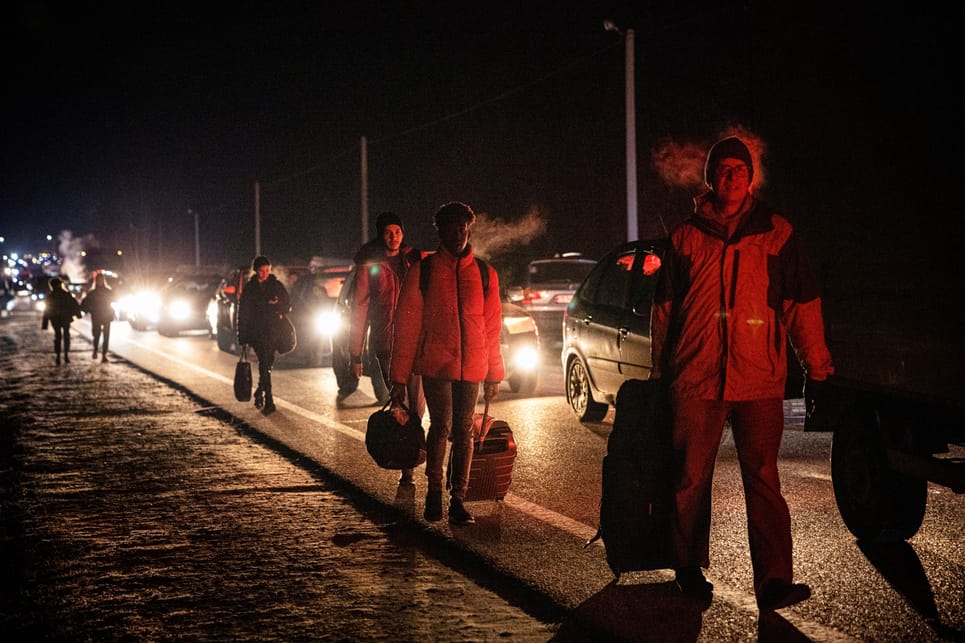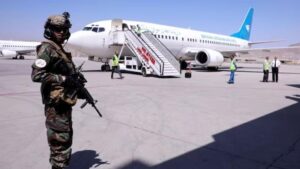Russia-Ukraine war latest: what we know on day 240 of the invasion

Russia-Ukraine war latest: what we know on day 240 of the invasion
Six people have been injured Friday morning in a Russian strike at “an object of industrial infrastructure” in the city of Kharkiv, according to a Telegram post by the regional governor, Oleh Synyehubov. A series of explosions have also been reported in Ukraine’s south-eastern city of Zaporizhzhia, and no casualties were reported after strikes on the coast of the Kutsurub community in Mykolaiv region.
Ukraine’s president Volodymyr Zelenskiy has accused Russia of planning to destroy a hydroelectric dam in the eastern Kherson region, where Ukrainian soldiers have been steadily advancing and Moscow-installed authorities have begun what they call ‘evacuations’ of civilians. Late on Thursday Zelenskiy accused Moscow of planting mines at a the dam in the Russian-occupied region, posing a threat to a 400km Soviet-built long canal network.
The UK Ministry of Defence has claimed Russia orchestrated a distraction campaign by announcing that 70,000 Belarusian troops would be involved in a new Russian-Belarussian group of forces. It is unlikely that Russia has actually deployed a significant number of extra troops into Belarus and the announcement is likely an attempt to convince Ukraine to divert forces to guard the northern border, according to British intelligence.
A Russian court has ordered the arrest of television journalist Marina Ovsyannikova, local media reports. Ovsyannikova was under house arrest and has already fled Russia, her lawyer said this week.Iran deepened its involvement in Russia’s invasion of Ukraine by providing technical support for Russian pilots flying Iranian-made drones to bomb civilian targets, the White House confirmed. The US national security council’s John Kirby said on Thursday that it was the US’s understanding that the Iranian advisers were in Crimea to provide training and maintenance – but not to actually pilot the drones – after Russian forces experienced difficulties in operating the unmanned flying bombs.
Ukrainian foreign minister Dmytro Kuleba has spoken to Israeli prime minister Yair Lapid and discussed in detail Kyiv’s request for air and missile defence systems and technology.The UK is implementing new sanctions on three Iranian individuals and a business responsible for supplying Russia with drones used to bombard Ukraine. By supplying these drones Iran is “actively warmongering, profiting off Russia’s abhorrent attacks on Ukrainian citizens, and adding to the suffering of the people and the destruction of critical infrastructure”, a foreign office statement said. The assets of all four have been frozen and the individuals are also subject to travel bans.
Prior to the UK’s announcement, the EU agreed sanctions against the same business and three individuals. Tehran denies supplying the drones to Moscow, while the Kremlin said the west is seeking to put “pressure” on Iran with accusations that Moscow is using drones made in the country.
Ukraine began restricting electricity supplies across the country starting from 7am on Thursday in response to Russia’s strikes against its energy infrastructure. A barrage of more than 300 attacks have destroyed a third of all power plants across the country, President Zelenskiy said. Ukrainians will now need to prepare for “rolling blackouts” and people will have to conserve energy, the deputy head of the president’s office, Kyrylo Tymoshenko, warned.
A Russian air strike that hit a major thermal power station in the city of Burshtyn in western Ukraine on Wednesday has caused “quite serious” damage, the region’s governor said on Thursday.A Russian aircraft released a missile near a British plane patrolling in international airspace over the Black Sea on 29 September, the UK defence secretary, Ben Wallace, revealed. He told the House of Commons that the Russians blamed the incident on a “technical malfunction”.
German Chancellor Olaf Scholz said on Thursday that Putin was using energy and hunger as weapons but has failed to break the west’s unity and will not achieve his war aims through scorched earth tactics. “We will not let Moscow’s latest escalation go unanswered. Scorched earth tactics will not help Russia win the war. They will only strengthen the unity and resolve of Ukraine and its partners,” Scholz told the German parliament.





